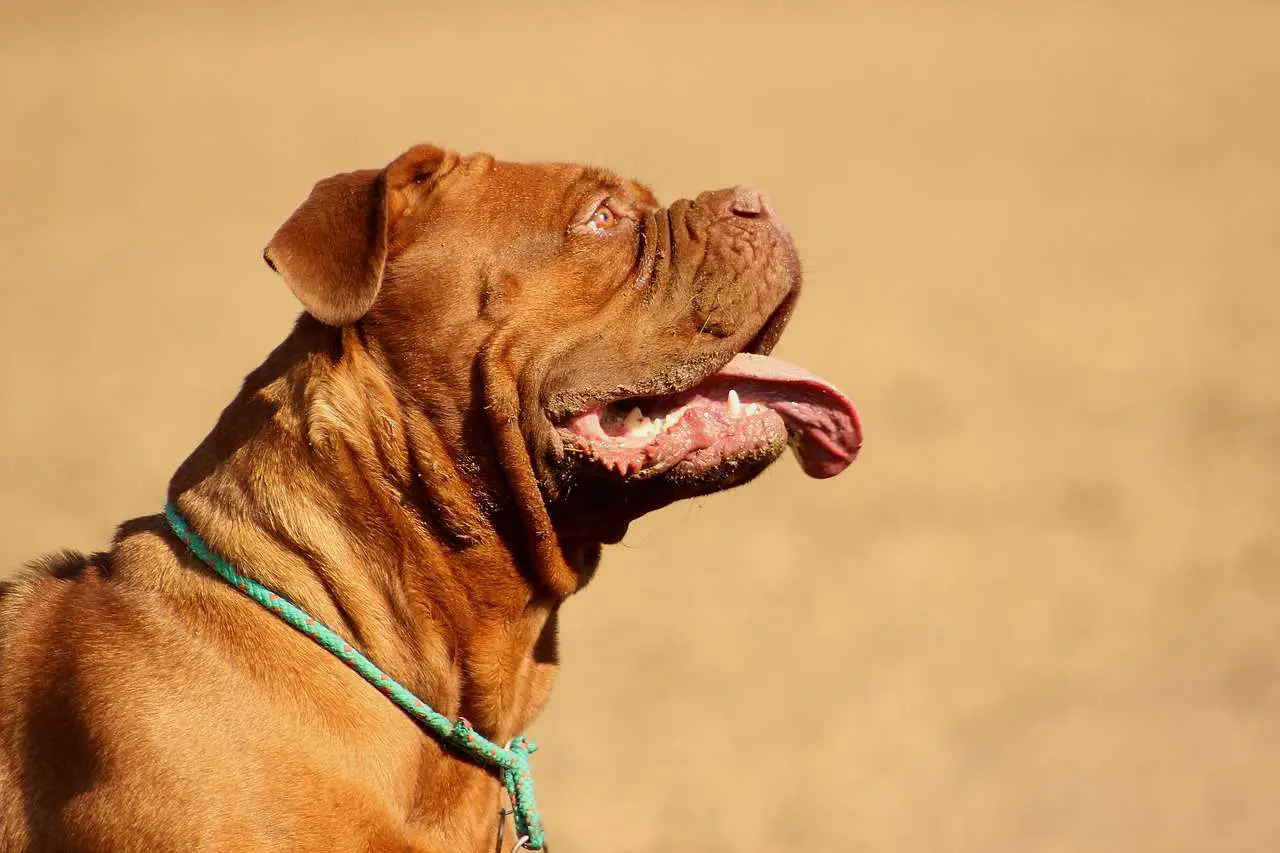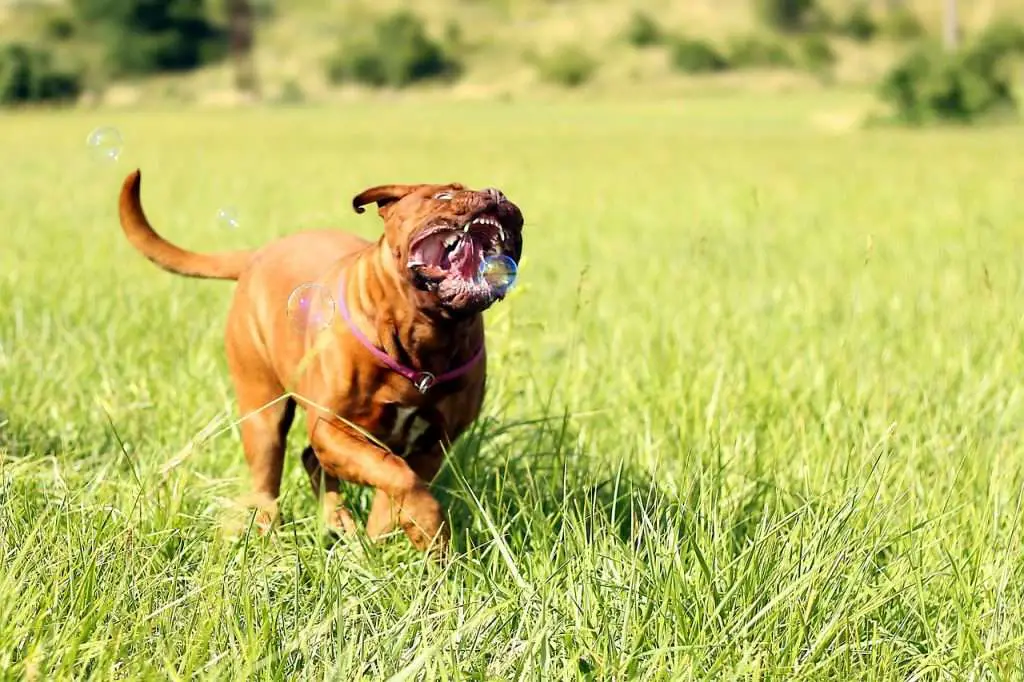The sad Story Of The Dogue de Bordeaux Lifespan & its Common Health Problems

Also known as the French Mastiff, the average Dogue de Bordeaux lifespan is estimated to be around 5-6 years. Sadly, this handsome breed has a relatively short lifespan when compared to most other dogs and members of the Mastiff family.
As a previous owner of this gentle giant, I too have had to go through the pain of saying goodbye too soon. Aware of some of the health concerns, many owners also share stories of their DDB living up to 8-9. Foolishly my bias assumed mine would be the same. It may happen to other owners, but surely not me.
As heart breaking as it is, it’s not uncommon for larger breeds to have shorter lifespans, the same goes for the Great Dane. This of course doesn’t make things any better for caring owners and raises a lot of questions, such as:
- What are the common health problems that plague this breed?
- How do you prioritise those health problems?
- Are there any interventions to help overcome the health concerns?
- Why does such an ancient breed still have such a short lifespan?
When you’ve finished this guide, be sure to check out our Dog Bite Statistics guide to stay informed about the true risks of dog bites.
Why does the Dogue de Bordeaux have such a small lifespan?
The Dogue de Bordeaux lifespan is worryingly brief. A study in 2018 published the results of 218 owners and found that over the course of a year, around 31% of the dogs had passed away suddenly.
It’s extremely difficult to know the exact cause of sudden death as the breed comes with numerous concerns. More research is definitely needed. However, it is assumed that cardiac issues were the most commonly associated.
Outside of the known health concerns that typically develop over the course of the dogs life, DDB pups statistically have a fairly rough start to life compared to other breeds.

First of all, mothers tend to have large litters of pups (around 8-10). The still-born rate in pups is around 14%, a high rate of the pups also die within the first week, estimated to be around 10%. Finally, around 25% of mothers require delivery by caesarean section which can cause other complications, treatments and so on.
So between a difficult start to life and an accumulating list of health concerns, it’s easy to see why the lifespan of the French Mastiff is so short.
What are the common health problems of the Dogue de Bordeaux?
There are numerous health concerns with the breed as they age. Many can be identified from puppyhood, and responsible breeders should educate new owners on the potential risks associated with the breed. The following is a list of health issues that confront this sweet giant.

Heart Problems in Dogue de Bordeaux
Cardiac issues are one of the most prevalent health concerns with the French Mastiff. A high percentage of heart problems are inherited from parents.
Dilated cardiomyopathy causes the heart to become thin walled and dilated. This may lead to congestive heart failure which is a build up of fluid, especially in the lungs. Secondly, there may also be dysrhythmia which is an abnormal heartbeat that can result in sudden death due to inadequate blood circulation.
Heart disease can be detected through electrocardiography (ECG) which records the electrical activity of the heart as it beats. Sometimes the DDB can have heart disease without heart failure which can cause it to go undetected.
Is there anything you can do to overcome this?
Much of this is unfortunately down to genetics. However, there are a couple of steps you can take to lessen the risk. These are:
- Assess your breeder options. Quiz them on cardiac concerns in their breeding line.
- Ensure litters have been assessed by a qualified vet before purchasing.
- Responsible ownership such as a good diet, mild exercise and ensuring your DDB doesn’t overheat too often may also help with longevity.
Epilepsy in Dogue de Bordeaux
Primary or idiopathic epilepsy can occur in this breed. This is usually an inherited problem that may be exacerbated by a poor lifestyle. It usually starts to occur between 6 months and 3 years of age.
Can Epilepsy be cured in your Dogue de Bordeaux
A diagnostic visit to the vets may help determine the cause. However, lifelong medication is usually prescribed alongside frequent blood tests. If your dog is prone to seizures, it’s best that you try to ensure it doesn’t injure itself such as biting its tongue or falling dangerously.
Bloat in Dogue de Bordeaux
Gastric bloat is not uncommon for the DDB and affects many breeds of large chested dog, especially in the Mastiff family.
Bloat is a condition caused by the twisting of the stomach which traps gas and contents and results in painful swelling. Serious bloat can require urgent medical treatment by a vet. Symptoms to watch out for are:
- Panting
- Salivating
- Whining
- Pacing around the room or laying in odd places
- Vomiting
- Excessive drooling
- Visible swelling in the abdominal area
How to reduce the chances of bloat
Bloat usually occurs because the dog is eating too much, too quickly or has eaten something inflammatory. There are a couple of proactive measures you can take to reduce the occurrence of bloat, which are:
- Add ingredients (such as frozen elements) to the dog food that require chewing before swallowing.
- Feed small quantities throughout the day, rather than one large meal.
- Use a bowl stand to improve the posture of your dog’s neck as it eats.
- Ensure your dog is taking in adequate water.
Hypothyroidism in the Dogue de Bordeaux
This is a common hormonal issue found in many dogs, and certainly not exclusive to the French Mastiff. The thyroid plays an important role in growth and maintaining normal metabolism in the dog.
The most common visible symptom of this is weight gain. But can also be accompanied by a lethargic nature and skin issues such as (over oily coat, loss of hair, dandruff and scratching).
Can you overcome hypothyroidism in your dog?
Thankfully yes. Treatment for this issue is common and usually comes in the form of a pill that can be taken once or twice a day. The issue should start to resolve itself in around 4-6 weeks.
Hip & Elbow Dysplasia in the Dogue de Bordeaux
Many dogs can suffer from hip and elbow dysplasia. It is caused when the femoral head does not fit inside the hip socket. Over time this can cause severe joint issues which come with a lot of pain and mobility issues the older your dog becomes.
The DDB can also be a bit clumsy and certainly isn’t light footed. This can lead to heavy falling onto elbow joints which can cause issues with cyst development. This however may take care of itself over time, or may require a visit to your local vet.
Can you overcome hip and elbow dysplasia in the French Mastiff?
There are efforts from breeders and veterinarians to eliminate hip dysplasia. All dogs should be x-rayed and hip scored.
Again, this is something to assess with your breeder when you’re in the process of buying the dog. Try to understand if this runs in the family.
Panosteitis (Pano) in the Dogue de Bordeaux
Pano is also known as long bone disease. It can occur in puppies between 6-12 months. It results in excessive bone production and is thought to occur due to puppies eating a high protein diet (common for many larger breeds). Pano is usually visible in the legs and is thought to be relatively painful for puppies to go through.
What can you do about Pano?
Puppies will usually grow out of this stage as they get older and it rarely goes beyond two years. Bouts of Pano do come and go, so we recommend owners stay attentive and offer comfort to their puppies if they see distress.
Brachycephaly in the Dogue de Bordeaux
The term “brachycephalic” simply means that the breed has a shortened and flattened face. Although, aesthetically for many this feature is what charms a lot of owners, it does have its downsides as it can cause a lot of breathing and overheating problems.
Although this isn’t necessarily a direct “health problem”, it can cause knock-on effects to anxiety, which may eventually trigger underlying heart concerns.
How to deal with brachycephaly
It’s part of the breed standard. However, you can take measures to control its harmful side effects. We recommend ensuring there are cool spots around the house, cool water is plentiful and that you ensure your DDB doesn’t spend too long in the direct sun or heat.
Eye Trouble with the Dogue de Bordeaux
This is common in many breeds with loose skin around the face. Responsible owners should keep an eye out for any irritation, build up or discharge that is forming around the eyes.
Is there anything you can do for their eyes?
Try to stay on top of any gunk forming and remove gently. If your DDB is having ongoing issues such as ulcers or infections then it may be worthwhile taking them to your vet. A vet can perform minor corrective surgery which stops the excess skin and fur from rubbing the dog’s eyeball.
Skin conditions with the Dogue de Bordeaux
This breed is a moderate shedder and can be sensitive with allergies and dermatitis and is even prone to demodectic mange.
Demodectic mange may be a hereditary issue within the breed, especially where a weakened immune system is prevalent. This is something that may occur in bouts throughout the life of a DDB and is well worth keeping an eye on.
How can you treat skin conditions for your French Mastiff?
Things such as demodectic mange may be genetic, so we once again recommend that you bring this up with your breeder.
The good news is that most skin conditions are treatable by your vet and through healthy lifestyle interventions. Many dog owners also recommend a raw diet for improving the look and feel of the coat and to keep inflammation in check.
Final thoughts on the Dogue de Bordeaux lifespan
Undoubtedly this is a sad read for any lover of the breed. The short Dogue de Bordeaux lifespan is a result of many health conditions that plague this ancient breed that have potentially been amplified over the years.

With that said, we suggest all future owners find reputable breeders and quiz them accordingly on their genetic line to try to find issues such as cardiac abnormalities, joint dysplasia, seizures and so on. Getting this right may help you minimise the common health issues as much as possible.
Outside of this, owners should commit to healthy lifestyle choices for their dog. Frequent exercise, healthy food, good grooming and health checks and a loving and attentive owner can ensure your Dogue de Bordeaux has a high quality of life so that you can enjoy each other’s company for as long as possible.
I found this article very informative. Thank you Mtrl Hunter